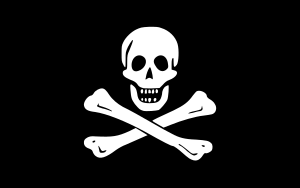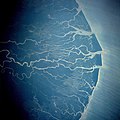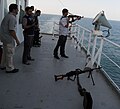
Back بوابة:قرصنة Arabic প্রবেশদ্বার:জলদস্যুতা Bengali/Bangla Portail:Piraterie French Портал:Пиратство Russian
Introduction

Piracy is an act of robbery or criminal violence by ship or boat-borne attackers upon another ship or a coastal area, typically with the goal of stealing cargo and other valuable goods. Those who conduct acts of piracy are called pirates, and vessels used for piracy are called pirate ships. The earliest documented instances of piracy were in the 14th century BC, when the Sea Peoples, a group of ocean raiders, attacked the ships of the Aegean and Mediterranean civilisations. Narrow channels which funnel shipping into predictable routes have long created opportunities for piracy, as well as for privateering and commerce raiding.
Historic examples of such areas include the waters of Gibraltar, the Strait of Malacca, Madagascar, the Gulf of Aden, and the English Channel, whose geographic structures facilitated pirate attacks. The term piracy generally refers to maritime piracy, although the term has been generalized to refer to acts committed on land, in the air, on computer networks, and (in science fiction) outer space. Piracy usually excludes crimes committed by the perpetrator on their own vessel (e.g. theft), as well as privateering, which implies authorization by a state government.
Piracy or pirating is the name of a specific crime under customary international law and also the name of a number of crimes under the municipal law of a number of states. In the 21st century, seaborne piracy against transport vessels remains a significant issue, with estimated worldwide losses of US$25 billion in 2023, increased from US$16 billion in 2004. (Full article...)
Selected biography -
Sir Henry Morgan (Welsh: Harri Morgan; c. 1635 – 25 August 1688) was a Welsh privateer, plantation owner, and, later, Lieutenant Governor of Jamaica. From his base in Port Royal, Jamaica, he and those under his command raided settlements and shipping ports on the Spanish Main, becoming wealthy as they did so. With the prize money and loot from the raids, Morgan purchased three large sugar plantations on Jamaica.
Much of Morgan's early life is unknown; he was born in an area of Monmouthshire that is now part of the city of Cardiff. It is not known how he made his way to the West Indies, or how the Welshman began his career as a privateer. He was probably a member of a group of raiders led by Sir Christopher Myngs in the early 1660s during the Anglo-Spanish War. Morgan became a close friend of Sir Thomas Modyford, the Governor of Jamaica; as diplomatic relations between the Kingdom of England and Spain worsened in 1667, Modyford gave Morgan a letter of marque, or a licence, to attack and seize Spanish vessels. Morgan subsequently conducted successful and highly lucrative raids on Puerto del Príncipe (now Camagüey in modern Cuba) and Porto Bello (now Portobelo in modern Panamá). In 1668, he sailed for Maracaibo, Venezuela, and Gibraltar, on Lake Maracaibo; he plundered both cities before destroying a large Spanish squadron as he escaped. (Full article...)Selected article -
Did you know?
- ... that HMS Redpole, one of the aptly-named coffin brigs, sank in an action with a pirate vessel in August 1828?
- ... that the developers of Hotline Miami 2: Wrong Number suggested that Australian customers pirate their game?
- ... that indigenous Australian artist Daniel Boyd has depicted colonial figures including Captain James Cook and Governor Arthur Phillip as pirates?
- ... that Black Sheep Radio dedicated its first day of programming to a fallen pirate?
- ... that Saudi Arabian broadcaster beoutQ pirated and resold beIN Sports programmes during the Qatar diplomatic crisis?
- ... that since 1904 the Gasparilla Pirate Festival in Tampa, Florida, has featured a pirate-themed parade?
- ... that, while it is unknown if pirates actually kept parrots as pets, it is thought that at least some captains kept cats aboard to keep populations of rats and other vermin down?
- ... that in the Golden Age of Piracy, the word "pirate" was often spelled "pyrate" or "pyrat"?
- ... that there is only one account of walking the plank?
Selected quotations
| “ | Now for our affair's are on the razor's edge, men of Ionia, wither we are to be free or slaves ... so if you will bear hardships now, you will suffer temporarily but be able to overcome your enemies | ” |
| — Dionysius the Phocaean | ||
General images
Selected Jolly Roger

Subcategories
Topics
WikiProjects
Related portals
Things you can do

Contribute
- Work on piracy and pirate articles and help improve them to featured articles.
Expand
Join
WikiProject Piracy Requests
- eliminate red links from List of pirates
- expand Timeline of piracy, specifically to fill in vast gap between the 1890s to 2000s
- revise Bartholomew Roberts
- help with Requested articles and Expand articles
- help with Portal:Piracy
Associated Wikimedia
The following Wikimedia Foundation sister projects provide more on this subject:
-
Commons
Free media repository -
Wikibooks
Free textbooks and manuals -
Wikidata
Free knowledge base -
Wikinews
Free-content news -
Wikiquote
Collection of quotations -
Wikisource
Free-content library -
Wikiversity
Free learning tools -
Wiktionary
Dictionary and thesaurus









































































































